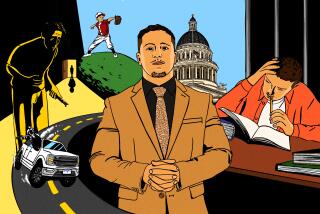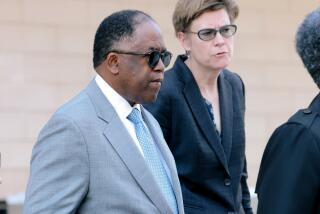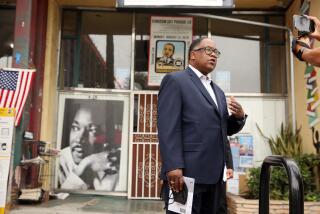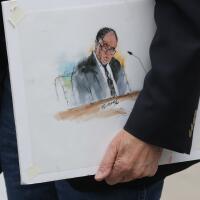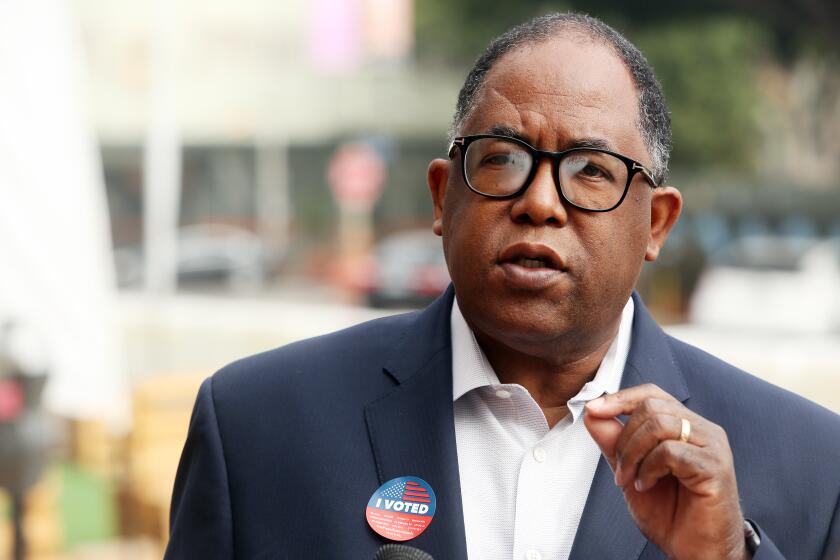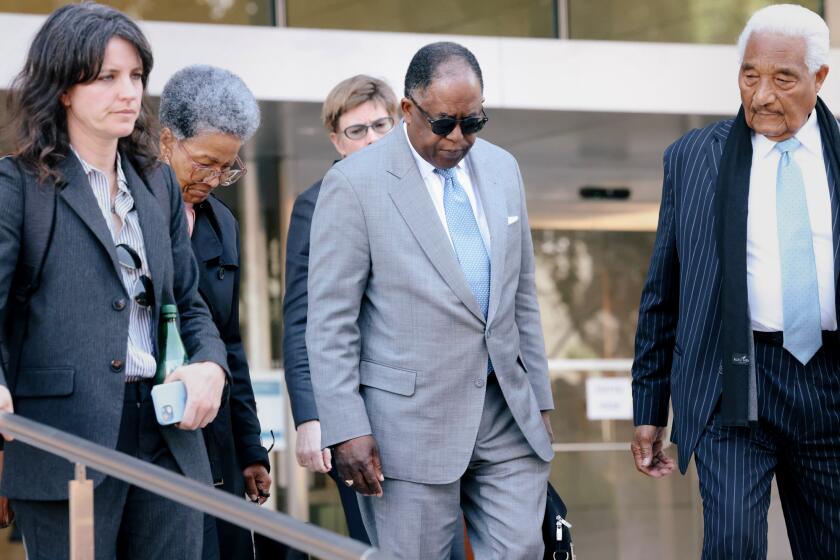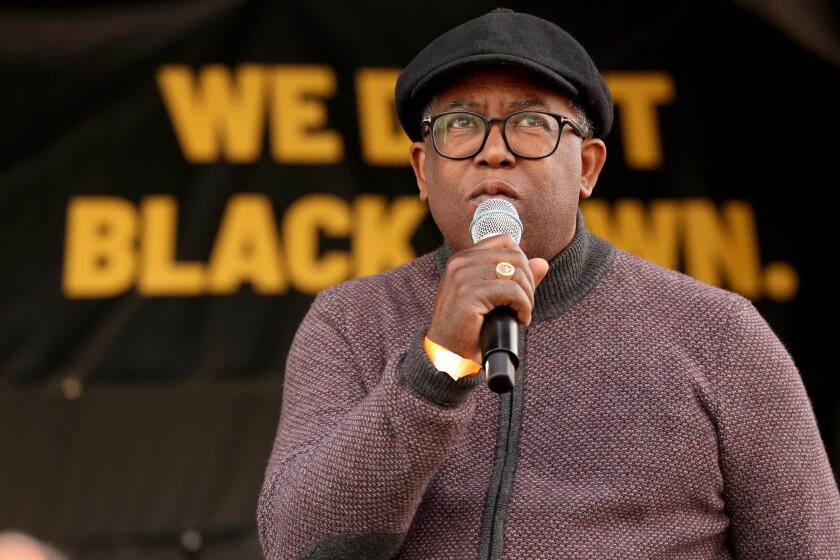As trial determines Ridley-Thomas’ fate, his son’s life gets dissected
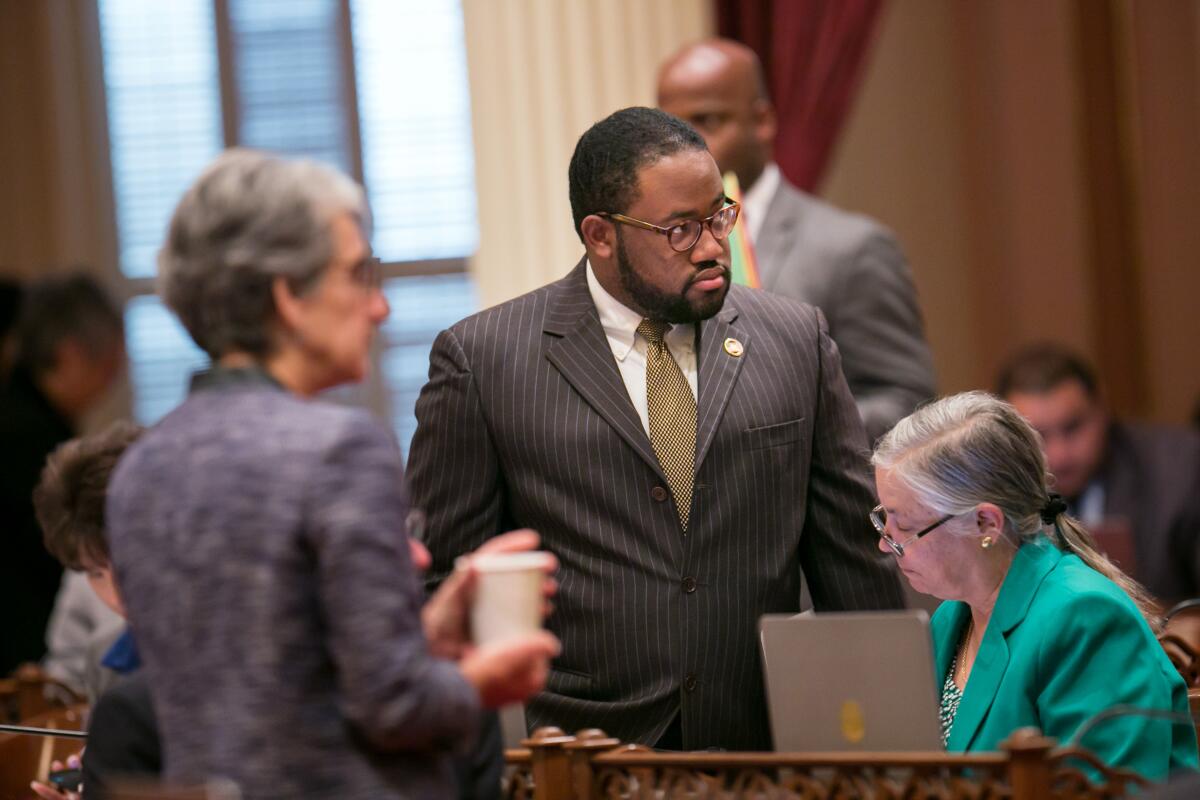
He has not been charged with a crime. But in the ongoing trial of suspended Los Angeles City Councilmember Mark Ridley-Thomas, his son is in the spotlight.
Jurors have seen photos of Sebastian Ridley-Thomas, read his words in emails and heard about his rising debt, medical problems, education and career.
In 2017, Sebastian Ridley-Thomas was 30 years old and abruptly resigned from the state Assembly before the end of his third term in office.
Publicly he blamed his deteriorating health. But in the final weeks of that year, as the #MeToo movement raged against the powerful and privileged, Sebastian Ridley-Thomas was under investigation related to two sexual harassment complaints — a fact that was left out of his resignation letter but that was apparently on his mind, and his father’s.
“FYI … rumors are another Los Angeles Legislator is next,” Sebastian Ridley-Thomas wrote to his father when he forwarded news of Assemblymember Matt Dababneh’s resignation amid sexual misconduct allegations.
“Don’t react,” Mark Ridley-Thomas urged his son. “These are scare tactics.”
Sebastian’s status as a ticking time bomb of scandal animates prosecutors’ case against his father, making the son all at once a motive, a beneficiary of the alleged corruption and an alleged co-conspirator.
In prosecutors’ telling, Mark Ridley-Thomas, sensing a threat to the family’s political brand, helped choreograph Sebastian’s resignation to come out between Christmas and New Year’s Day, and leaned on a USC dean to secure a landing spot for his son, including a scholarship, a job and a donation to a nonprofit.
As Ridley-Thomas’ lawyers began presenting their defense Tuesday, Sebastian remained in the center.
Their first witness was Dr. George Mallouk, Sebastian’s primary care doctor, who detailed his patient’s medical problems in 2016 and 2017, including a gallbladder removal surgery. Mallouk acknowledged he did not know of the looming sexual harassment inquiry, but told jurors that he worried about his patient’s poor overall health.
“I started to wonder if this is the career for him,” Mallouk testified.
By late November 2017, officials at the Capitol notified Sebastian Ridley-Thomas of an investigation into two sexual harassment complaints, according to testimony and court records.
Within days, he appeared to be considering a resignation, with a former aide warning him that doing so without a reason would invite speculation.
On Dec. 5, Sebastian was emailing the head of USC’s public policy school, Jack Knott, about the part-time professor position he hoped would pay $25,000 while he completed a social work and public policy dual-degree program.
“‘Practitioner-In-Residence’ is a preferable title,” Sebastian wrote, blind-copying his father. “I would like to be ready to launch in January.”
Sebastian had been in touch intermittently with USC officials over studying or working there. Months earlier, the dean of USC’s social work program had compared Sebastian to another prominent former student who received a full scholarship, L.A. Mayor Karen Bass. “I intend to open every door for him, just as I did with Karen,” Dean Marilyn Flynn wrote.
In the final weeks of 2017, Flynn urged her staff to “give highest priority to” enrolling Sebastian, even though he had not yet submitted his transcripts for admission. Meanwhile, Knott, the public policy dean, had told Sebastian that his timeline of confirming a job to start in January was not feasible.
Flynn intervened, telling Knott: “I think in the interests of showing [Mark Ridley-Thomas] that we can deliver, it would be provident to get the offer letter out before the holidays.”
Prosecutors suggest that Flynn’s urgency came after Mark Ridley-Thomas leaned on the head of L.A. County’s Department of Mental Health, Dr. Jonathan Sherin. After a three-minute call on the morning of Dec. 14, he immediately shared Sherin’s contact information with Flynn, explaining, “He’s ready to go,” with a wink emoji.
The same day, Ridley-Thomas’ deputy emailed Flynn with an introduction to Bobby Cagle, then the head of the county’s child welfare agency. “Supervisor Ridley-Thomas has asked that I connect the two of you and facilitate a meeting to discuss a partnership,” the deputy told Flynn.
Hours later, Flynn emailed one of her aides with Sebastian’s address to get a job offer out to him. “Hope we can get this done,” Flynn told her aide.
Soon, rumors swirled at the Capitol. There was speculation he was among “the next #MeToo to go” in the Legislature, as one tweet shown to jurors put it.
A public relations team that included two Sacramento-based attorneys along with two former Times staffers who now consult in PR crises — Ralph Frammolino and Glenn Bunting — traded emails and revised response and resignation statements with Mark Ridley-Thomas.
Ridley-Thomas emailed Bill Wong, a Sacramento political consultant, and blind-copied his son.
“I like the nuanced language in the red parentheses ... they are suggestive without being defensive,” wrote Wong regarding one draft that described Sebastian’s health issues as “persistent” rather than “significant.”
The news of his resignation came on Dec. 27, 2017. It would be months before residents of a district spanning West L.A. to Culver City to Leimert Park had a representative in the Assembly.
The next day, Bunting emailed Mark Ridley-Thomas, “Today’s key. Let’s hope for smooth sailing.”
When a Capitol blog wrote that “eyebrows must be raised” about Sebastian’s not-so-surprising departure, Mark Ridley-Thomas appears to have considered responding.
Wong recommended keeping quiet.
“I think people will move on as long as the reality of Sebastian’s health problem is a plausible alternate narrative and our reaction to rumors/gossip do not come across as overly defensive,” Wong wrote.
Wong recently told The Times he knew of rumors at the time of the resignation, but said, “I cannot confirm whether those allegations are true.”
Bunting told The Times his firm was hired to assist in announcing the resignation. “As part of our due diligence, we received independent verification of his medical conditions,” Bunting said in an email.
Sebastian’s classes began the week of Jan. 8, 2018. A week later, he reached out to the deans of USC’s social work and public policy programs regarding a job, “Is there a written offer or agreement?”
Flynn forwarded the message to her aide Michele Clark. “Would you jump all over this? We need to get this finished,” she said.
Clark testified that the tone of the email conveyed Flynn’s haste. By early March — two months after Sebastian’s resignation — the offer letter finally was mailed out.
Several USC officials said they would have liked to have known about the pending sexual harassment inquiry before he was hired.
“It’s really important within our school to provide good role models for our students,” testified Michael B. Nichol, an associate vice provost at USC. Nichol was so suspicious after Sebastian resigned that he ordered the most intense background check on him before he was hired as a part-time professor. Nothing derogatory was uncovered, he said.
When Sebastian resigned, he claimed to have just undergone his fifth surgery that year, and that his physicians told him he needed “an extended period of time to recuperate.”
Those two assertions have come under scrutiny in trial.
Asked whether there were five surgeries in 2017 in Sebastian’s medical record, FBI Special Agent Brian Adkins testified, “I don’t think so,” adding, “It depends on your definition of surgery.”
Adkins said the final surgery was elective and came on Dec. 18 — around the date that statehouse lawyers sought to question Ridley-Thomas in the sexual harassment inquiry.
The defense has put forth Mallouk, Sebastian’s doctor, who said he helped coordinate procedures in 2017, including a gallbladder removal, two procedures related to draining an abscess, and two involving a painful gastrointestinal wound.
Sebastian, he said, was stressed by work, and his wounds were not healing.
“Were you concerned about Sebastian’s health?” said defense attorney Galia Amram. Yes, the doctor said.
“Did you recommend he find a new line of work,” the lawyer asked. “I did,” Mallouk replied.
Under cross-examination, Assistant U.S. Atty. Lindsey Dotson asked where in Sebastian’s 800-page medical file was a recommendation that he resign.
“I’m not aware that it’s in there,” Mallouk replied.
Dotson pressed, asking whether he knew his patient was seeking admission to a dual-degree program at USC, launching a nonprofit and a consulting firm, and seeking a job as a professor.
“I was not aware,” the doctor said.
More to Read
Start your day right
Sign up for Essential California for news, features and recommendations from the L.A. Times and beyond in your inbox six days a week.
You may occasionally receive promotional content from the Los Angeles Times.
